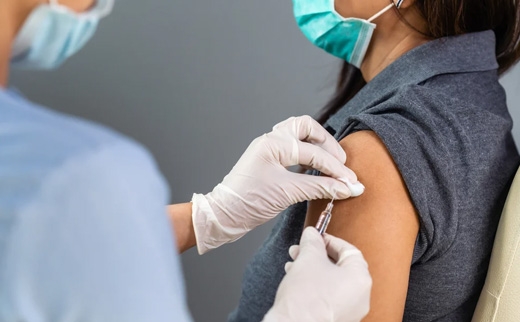
Vaccines are biological products prepared and given to the body in various ways to immunize them against infection. Vaccination is administered to healthy and at-risk people to protect them from the disease and the consequences caused by the diseases.
The body recognizes microbes or toxins in vaccines that do not harm itself and develop a defense against them. Thus, when the body encounters the microbe, it uses this defense system that has previously developed by the vaccine to fight the microbe and the person does not get the disease. This person is now immune to that disease. The immunization that occurs usually stays in the body for a lifetime and when it encounters the disease agent, it fights to render it ineffective.
People of reproductive age and also the couples who are trying to have a baby are advised to have the vaccine when they receive their invitation for vaccination.
None of the vaccines contain live virus and there is absolutely no evidence, and no theoretical reason, that any of the vaccines can affect the fertility of women or men.
During your fertility treatment, as you do not want to have some unpleasant side effects such as tenderness at the injection site, fever, headache, muscle ache or feeling tired within a few days after the Covid19 vaccine you may wish to consider the timing of the vaccination.
During some treatment procedures (eg egg collection in IVF) it may be reasonable to dedicate a few days to the Covid 19 vaccination date so that any symptoms such as fever can be accurately attributed to the vaccine or treatment procedure.
If you want to be protected against Covid-19 before you are pregnant you can delay your fertility treatment until after you have been vaccinated.
Your chance of getting pregnant is unlikely to be affected by a short delay, up to 6 months, particularly if you are 37 years of age or younger. However, delays of several months may affect your chance of getting pregnant if you are over 37 and especially if you are 40 years of age or older.
There is no reason to postpone having your Covid-19 vaccine as it will not affect your chance of getting pregnant and the risk of having a miscarriage.
You can start your fertility treatment immediately unless you wish to have your second dose before pregnancy.
Since there is no substantial evidence yet to guarantee the safety of the vaccine in women trying to conceive, pregnant or breastfeeding, all vaccination programs have so far excluded these women. However, as the evidence to date does not raise any concerns regarding the safety of the vaccine in pregnancy, the consensus on its suitability to be performed in these population groups varies:
Women who are planning to get pregnant, are pregnant, or lactating need to consider before finalizing their decision:
Patients who decide to proceed with the vaccination should still follow the imposed guidelines for COVID prevention.
CDC states that any of the currently authorized COVID-19 vaccines can be offered to people who are pregnant or breastfeeding belong to the population eligible to receive the vaccine. Getting vaccinated for each individual is a personal choice.
People who would like to have a baby:
Is it safe for pregnant women, those planning to become pregnant, and breastfeeding mothers to receive COVID-19 vaccines?
Based on knowledge on these vaccines until now, there is not any specific reason to believe there will be risks that would outweigh the benefits of vaccination for pregnant women. While pregnancy puts women at higher risk of severe COVID-19, little data are available to assess vaccine safety in pregnancy.
The pregnant women who are at high risk of exposure to SARS-CoV-2 (e.g., health workers) or who have comorbidities that add to their risk of severe disease may be vaccinated in consultation with their health care provider.
None of the vaccines contain live viruses and so there is no risk that the pregnant woman or her baby could get Covid-19 from the vaccine.
If you are in a risk category for Covid-19, either because of the potential for exposure at work or medical issues, you can still have the vaccine in pregnancy. If you have no increased risks for Covid-19, it advised that you delay it until after pregnancy.
There is no reason to believe that any of the Covid-19 vaccines would be harmful, but their effects in pregnancy have not yet been fully investigated.
The evidence and advice for COVID-19 vaccines and the latest data or best practice for those trying to achieve a pregnancy or those who are pregnant already is rapidly developing. It is recommended that patients always seek the advice of their local center if they have any concerns.